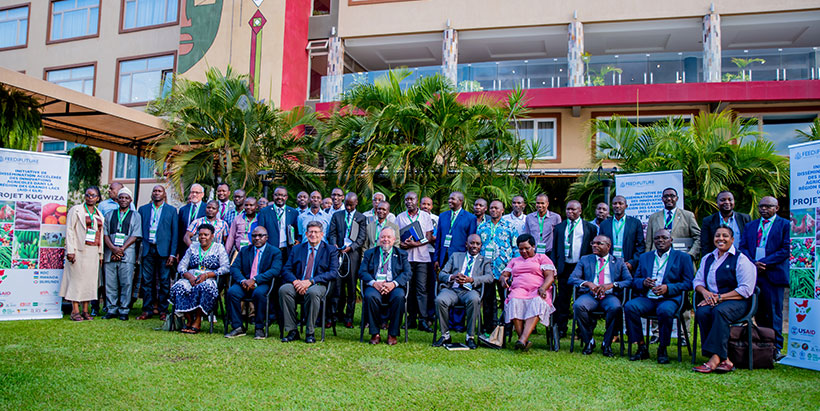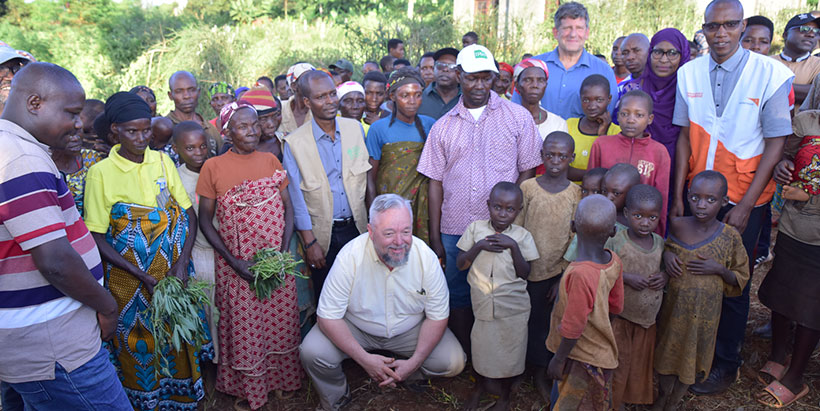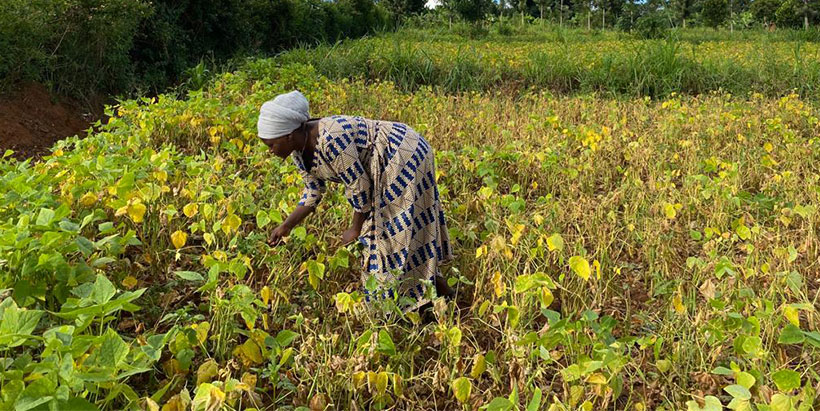The Accelerated Innovation Delivery Initiative in the Great Lakes Region (AID-I GLR) was launched in Burundi as Kugwiza Project. Kugwiza means “to increase” in the local Kirundi language.

Kugwiza Project partners and stakeholders during the launch.
IITA–CGIAR, the Government of Burundi, and the project donor Feed The Future through USAID, alongside scaling partners, development organizations, seed companies, farmers and farmer cooperatives, and other CGIAR Centers gathered in Bujumbura on 24 May to kick off the Kugwiza Project.
In Burundi, 90% of the population lives in rural areas and depends almost exclusively on agriculture and livestock, representing about 40% of the GDP. Agriculture, therefore, remains a priority for the development of the country.
Kugwiza Project seeks to boost agriculture and enhance food and nutrition security in Burundi through the rapid large-scale adoption of proven technologies and innovations developed mainly by CGIAR and partners.
The project collaborates with scaling partners operating in Burundi led by World Vision Burundi and Confédération des Associations des Producteurs Agricoles pour le Développement (CAPAD), development organizations, farmer cooperatives, and individual farmers to deliver improved agricultural technologies and innovations to farming households, henceforth support smallholder farmers increase production.

USAID Deputy Assistant Administrator in charge of resilience and food security (squating) graced the occasion.
Smallholder farmers in Burundi face many challenges, including limited access to quality seeds, inefficiency in the value chain of seed production, and challenges related to seed processing and storage, distribution, and marketing. And few farmers have access to quality seed.
A more sustainable seed sector is a catalyst to upgrade the agriculture sector and livelihood of farmers in Burundi. In this framework, the Kugwiza project targets to strengthen awareness and dissemination of improved and certified seeds for important value chains in Burundi, namely high iron beans, rice, milk, maize, cassava, banana, orange-fleshed sweet potato (OFSP), and poultry.
Since January 2023, partners and seed companies have engaged with farmers and farmer cooperatives to establish mother demonstration plots and plant certified high-iron beans, rice, maize, and OFSP seeds at the individual farmer level.
Kirundo Province is one of the locations where farmers have established demonstration plots and been trained in good agricultural practices. They gave testimonies about the new, improved seeds disseminated.
“We received bean seed varieties to plant, under Kugwiza Project, through Welt Hunger Hilfe (WHH). Previously we could yield 1 ton/hectare. Now, we foresee an increased yield from this variety to 2 tons/hectare. This variety, called Rufutamadeni, is a good variety and appeals to the eye. We thank the Kugwiza project that exposed us to this improved variety and best agronomic technologies. We have even tasted it, and these delicious beans will create a high demand on the market,” said Mukabirori Regine, a member of Terimbere Mukenyezi Cooperative in Kirundo Province.

Bean demo plot owned by Terimbere Mukenyezi Cooperative in Kirundo Province.
At the launch, the Minister of Environment, Agriculture, and Livestock in Burundi commended the Kugwiza project’s contribution to improving the seed system of the country. “I would like to congratulate and thank USAID and IITA for having financed the Kugwiza project, which intervenes in food and nutrition security, especially in these post-crisis periods of the COVID-19 pandemic and climate change. The project is a great coherence to the target of our government in agricultural research, extension, processing, and market access,” said Ndorimana Emmanuel, the Representative of the Minister at the launch event.
In Burundi, AID-I GLR aims to reach 500,000 households, including women, men, youth, and other social groups, at the end of the two years. The project also promotes gender transformative approaches through capacity strengthening and awareness creation on social and behavioral change by the use of community kitchen demonstrations and campaigns.
The two-year AID-I GLR project is a multiple-stakeholder initiative funded by Feed The Future through USAID and led by IITA. In Burundi, the project works in a consortium of two partnerships. The first consortium consists of Welt Hunger Hilfe (WHH) and Agency for Cooperation and Research in Development (ACORD) and is led by World Vision. Confédération des Associations des Producteurs Agricoles pour le Développement (CAPAD) leads the second partnership working alongside the World Food Program (WFP). AID-I GLR leverages the overwhelming expertise of the Seed Systems Group (SSG) to strengthen the adoption of certified seeds among farmers.
Contributed by Ritha Bumwe



No Comments